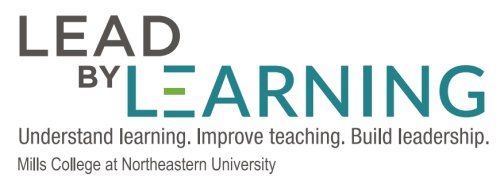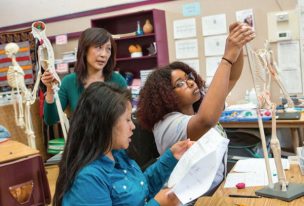Academic Discussion: Beyond Sentence Frames and Key Terms

What does it mean to move beyond turn and talk and sentence frames to give students a voice? How do teachers support formal academic language acquisition but also allow space for the essential meaning making and understanding which often happens in a more informal register? How do we build the social emotional competencies that are inherent in strong academic discussions?
These are some of the questions teachers are grappling with through their Mills Teacher Scholars inquiry work. In Oakland Unified and Berkeley Unified, teacher scholars at New Highland Academy, RISE Community School, Melrose Leadership Academy and Rosa Parks Elementary are collecting data on their students’ academic discussions to better understand what academic discussion looks like at the various grade levels and subject areas and to understand the core competencies necessary to successfully engage in these discussions.
At the district level, Mills Teacher Scholars is working with the Project Development Specialists team in OUSD to frame an inquiry space for specialists to consider what it looks like to support teacher leaders’ understanding of academic discussions and to understand how the tools they create support this understanding.
New Highland Academy Group Shares Inquiry Work at School Site Meeting
At a recent New Highland Academy Wednesday professional development, NHA teacher scholars shared their data on academic discussions with their school site colleagues and asked for their feedback. “Our Mills Scholars teachers exemplified how PD should be structured. The staff was engaged, reflective, and walked away with several ideas/strategies to try in their classrooms,” said Vice Principal Lorena Reyes.
Second grade teacher scholar leader teacher Joanna Davis shared with the staff that her Mills Teacher Scholars inquiry work has helped her come to realizations about who has opportunities for talk in her classroom. She explained how listening to what the students say helps her clarify her goals for these interactions:
“Looking at this transcript [of students’ science talks] I saw how much more volume of words is coming out of my mouth than out of the students’ mouths. The recordings made me realize what I am wanting from my students based on what some of the students were doing and what others were not doing.”
In order to remove herself from the conversation and get the students to do some of the synthesis work, Joanna has narrowed her focus: “I’m looking at the process of academic discussions and trying to understand whether or not the students are linking to partners’ comments.”
Working with both her OUSD science coach and with her Mills Teacher Scholars colleagues, Joanna hopes to better understand how to support students to listen to each other and make connections that she, in the past, has been making for them. In sharing her work with her colleagues, this new awareness impacts her own approach to instruction and that of other teachers at her school site.
Shifting Competencies, New Demands on Teachers
Both educational research and the Common Core State Standards are pushing the importance of students’ engagement in academic discussions to foster deeper content understanding and to develop critical thinking and communication skills.
The shift of focus from “having the answer” to creating opportunities for students to build their understanding is exciting, but it places tremendous demands on teachers.
Through our partnerships with districts, schools, and teachers, Mills Teacher Scholars endeavors to build both student and teacher competencies in the area of academic discourse.

